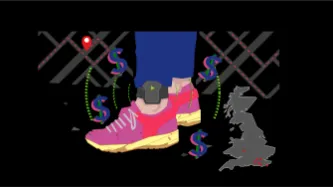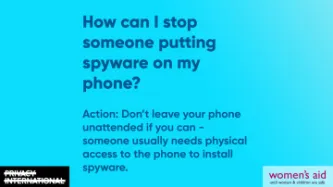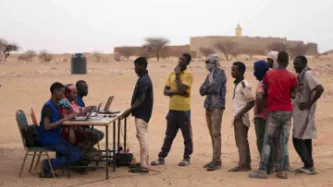Advanced Search
Content Type: Examples
L3Harris is contracted by the U.S. Space Force to develop space surveillance information though a programme known as MOSSAIC (the Maintenance Of Space Situational Awareness Integrated Capabilities). The program is said to provide space surveillance information for military, civil and commercial users.https://www.satellitetoday.com/government-military/2024/04/19/us-space-force-awards-l3harris-contract-option-for-space-surveillance-program/Publication: ViaSatelliteWriter: Rachel Jewett
Content Type: Examples
Israel based company, High Lander, is providing demos of its system, called Orion, to U.S. police departments, suggesting the drones can help in law enforcement, including by performing video surveillance, searching for people or vehicles using AI and thermal sensors. https://theintercept.com/2024/05/17/israel-orione-drone-us-police-louisiana/Publication: The InterceptWriter: Delaney Nolan
Content Type: Examples
Microsoft pitched the use of OpenAI's DALL-E software to support battlefield operations of the US Department of Defense, in seeming contravention of OpenAI's ban against working in the military field. One of the potential use cases proposed by Microsoft is to use DALL-E, OpenAI's image generation model, to train battle management systems. The efficacy, reliability and ethics of such a use of private AI are questioned by various experts. https://theintercept.com/2024/04/10/microsoft-openai-…
Content Type: Examples
Fusion Technology will earn $159.8 million over 5 years to work with the US FBI's Criminal Justice Information Services (CJIS). It will support the FBI in developing the National Data Exchange ("an investigative tool for agencies to search, analyze, and share criminal justice information"), the Law Enforcement Online System (for information sharing between local, state, tribal, federal, and international criminal justice agencies) and "Crime Data apps".https://www.biometricupdate.com/202404/…
Content Type: Examples
US data analytics firm Palantir, known for its numerous contracts with intelligence agencies, military forces, or law enforcement and immigration authorities, has been awarded a £330m contract to run a new mass database for the UK's health service (NHS). The deal comes four years after Palantir was awarded a £1 contract during the Covid-19 pandemic to build an analytics platform for the NHS. People and organisations across the political spectrum have voiced significant privacy and data…
Content Type: Examples
Over 60 US cities and counties use Fusus, a "police technology platform that merges public and private cameras with predictive policing and other surveillance tools". Private surveillance camera owners are encouraged to enroll in a police-led program that enables the police to control these cameras. The result is an expanstion of policed spaces and integration of all private and public surveillance systems in one comprehensive dragnet. And Fusus' platform does not stop at integrating CCTV…
Content Type: Examples
Notorious military tech company Anduril is pushing its technology to the border surveillance market. Along the US-Mexico border, its surveillance towers "use an artificial intelligence system called Lattice to autonomously identify, detect and track “objects of interest”, such as humans or vehicles. The cameras pan 360 degrees and can detect a human from 2.8km away." But border surveillance technology has been shown to lead people to lengthier and more dangerous routes as they seek to avoid…
Content Type: Report
This policy paper seeks to determine the potential for the existing international private military and security companies (PMSCs) regulatory framework to support more effective regulation of surveillance services provided by the private sector.In order to achieve this, and given that this paper addresses an issue that is at the intersection of two domains, it seeks to establish a common language and terminology between security sector governance and surveillance practitioners.In…
Content Type: Examples
When the Los Angeles Police Department opted to monitor the messages posted in forums on Neighbors, a companion app to Amazon's Ring doorbell cameras, the system forwarded over 13,000 messages in just over two years. Research shows, however, that this type of surveillance does a poor job of deterring property crime. A study of Neighbors posts in LA also shows that posters typically live in whiter, more affluent districts, and about 30% of posts did not describe criminal activity, just behaviour…
Content Type: Long Read
The rise of racist and xenophobic narratives around the world has led to a ramping up of brutal migration control policies. Indefinite detention, pushbacks of boats at sea, or deportation for offshore processing of asylum claims all now form part of the arsenal deployed by some governments to “appear tough” on and provide "solutions" to immigration. A stark example is the UK’s “hostile environment” policy, announced 10 years ago by then Home Secretary Theresa May and designed to deter migrants…
Content Type: Advocacy
We, the undersigned organisations, seek to draw your attention to aspects of the draft Corporate Sustainability Due Diligence Directive (the Directive), and its application to the use of technology and the technology sector, which require strengthening if the Directive is to realise its full potential in respect of this critical global sector that is today responsible for some of the most egregious human rights harms.
The technology and surveillance industries have ushered in an entirely new…
Content Type: Examples
The energy company Cuadrilla used Facebook to surveil anti-fracking protesters in Blackpool and forwarded the gathered intelligence to Lancashire Police, which arrested more than 450 protesters at Cuadrilla's Preston New Road site over a period of three years in a policing operation that cost more than £12 million. Legal experts have called the relationship between fracking companies and the police "increasingly unhealthy" and called on the ICO and the Independent Office for Police Conduct to…
Content Type: Examples
Emails obtained by EFF show that the Los Angeles Police Department contacted Amazon Ring owners specifically asking for footage of protests against racist police violence that took place across the US in the summer of 2020. LAPD signed a formal partnership with Ring and its associated "Neighbors" app in May 2019. Requests for Ring footage typically include the name of the detective, a description of the incident under investigation, and a time period. If enough people in a neighbourhood…
Content Type: Advocacy
Content Type: Explainer
Introduction/Background
Electronic tags have been a key part of criminal justice offender management for over 20 years, being used in the United States since the mid 1980’s and in the UK and some other commonwealth countries since 2003. In 2021 the UK introduced GPS tagging for immigration bail.
The tag is predominantly used to curtail the liberties of individuals. For those on criminal bail its intended use includes managing return into communities while deterring reoffending.
As we explore…
Content Type: Long Read
This piece is a part of a collection of research that demonstrates how data-intensive systems that are built to deliver reproductive and maternal healthcare are not adequately prioritising equality and privacy.
What are they?
Short Message Services (SMS) are being used in mobile health (MHealth) initiatives which aim to deliver crucial information to expecting and new mothers. These initiatives are being implemented in developing countries experiencing a large percentage of maternal and…
Content Type: Case Study
Privacy matters. It matters when you’re walking the streets of your home town and when you’re fleeing your home in search of safety. It matters if you’re at a protest or if you’re in bed.
Our wellbeing in each of these instances depends on the protection of our privacy. No situation can be fully understood in isolation.
Unjustifiable intrusions on our privacy become a weapon to eradicate communities and prey upon refugees and asylum seekers, push people away from protests in fear of…
Content Type: Case Study
Numerous sexist, mysoginistic, homophobic and racist practices are flourishing online, in ways that are harder for national authorities to stop than when abuse takes place offline. One of these practices is ‘revenge pornography’, which involves online distribution of private sexual images without the consent of the person depicted.
One victim of image based sexual abuse (more commonly known as revenge porn): Chrissy Chambers. Chrissy was 18 years old when her boyfriend convinced her to spend…
Content Type: Case Study
You have the right to decent standards and dignity at work, and the right to join a union to protect yourself and your rights. That might come as a shock to Amazon - who have been using Covid-19 as a reason to undermine those rights.
Chris Smalls, an organiser and now former Amazon warehouse assistant manager, led a walkout at a New York City facility and within days he’d been fired under a dubious pretext.
The walkout was to ensure workers’ safety - they were asking for the warehouse to be…
Content Type: Case Study
Over the past decade targeted advertisement has become exponentially more invasive. To enable targeted advertisement, massive amounts of data about individuals are collected, shared and processed often without their knowledge or consent. This information about us is then used to profile us and micro-target us to sell us products or influence our views.
This is a significant intrusion to our privacy inevitably affects our perogative not to reveal our thoughts; not to have our thoughts…
Content Type: Case Study
Since August 2017 742,000 Rohingya people - including children - fled across the Myanmar border to Bangladesh, escaping what the UN labelled a “textbook example of ethnic cleansing”.
In this context of ethnoreligious violence, Facebook has been a central figure. For many in Myanmar “Facebook is the internet” - as of January 2018 around 19 million people in Myanmar were facebook users, this is roughly equal to the number of internet users in the country.
A New York Times report revealed that…
Content Type: Case Study
The right to privacy is crucial to protect a couple’s equal rights within marriage.
The recent rise of spyware as an “off-the-shelf” product that anyone can purchase has been extremely worrying, as installing spyware on someone else’s phone means getting access to their contacts, their messages, their google searches, their location and more - all without them knowing.
Spyware is, increasingly, becoming another way for abusive spouses to control and monitor their partners. Nearly a third of…
Content Type: Case Study
In Peru, you get asked for your fingerprint and your ID constantly - when you’re getting a new phone line installed or depositing money in your bank account – and every Peruvian person has an ID card, and is included in the National Registry of Identity – a huge database designed to prove that everyone is who they say they are. After all, you can change your name, but not your fingerprint.
However, in 2019 the National Police of Peru uncovered a criminal operation that was doing just that:…
Content Type: Case Study
There are 29.4 million refugees and asylum seekers across the globe today. These are people who have fled their countries due to conflict, violence or persecution seeking protection in safer environments.
People have protected those in need fleeing from dire situations since antiquity. However, over recent years, European countries have become increasingly hostile towards refugees - treating them as criminals instead of people in need.
In 2017, German authorities passed a…
Content Type: Case Study
The increasing deployment of highly intrusive technologies in public and private spaces such as facial recognition technologies (FRT) threaten to impair our freedom of movement. These systems track and monitor millions of people without any regulation or oversight.
Tens of thousands of people pass through the Kings Cross Estate in London every day. Since 2015, Argent - the group that runs the Kings Cross Estate - were using FRT to track all of those people.
Police authorities rushed in secret…
Content Type: Case Study
In 2015, a man in Connecticut was charged with murdering his wife based on evidence from her Fitbit. Richard Dabate, the accused, told the police that a masked assailant came into the couple’s suburban home at around 9am on 23 December 2015, overpowering Dabate then shooting his wife as she returned through the garage.
However, the victim’s fitness tracker told a different story. According to data from the device, which uses a digital pedometer to track the wearer’s steps, Dabate’s wife was…















